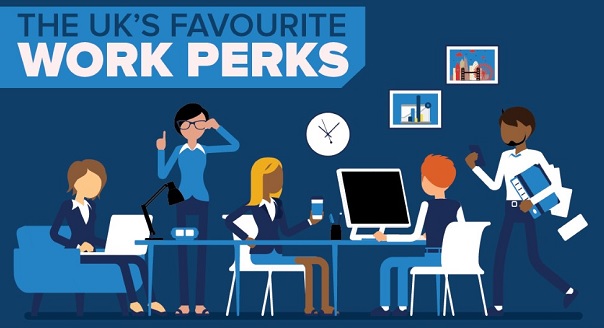Over a quarter of UK employees value additional holiday and flexible working time over perks such as employee discounts and company cars and even a pay rise, according to new research.
A recognition of one’s value can make all the difference to productivity and the atmosphere within a working environment.
However, when those perks seem more like a gimmick, they can have a negative effect and can make staff wonder if they’re an invaluable member of the team. SmallBusinessPrices.co.uk conducted a survey with UK employees to see if they are satisfied with their job benefits.
The study has revealed huge differences in what people want compared to what they get, such as 6% of employees currently receiving travel and company car benefit, although 16% of staff surveyed would rather have transport benefits over a pay rise.
The results are broken down in different ways, and the data reveals that:
• Men are 4.5% more satisfied with employee benefits than women. They were also more emphatic in their responses, with more voting for both the ‘very unhappy’ and ‘very happy’ categories than women, who chose ‘somewhat happy’ and ‘somewhat unhappy’ more.
• The most popular work perk was additional holiday or flexitime, but despite over a fifth of British workers choosing this as their favourite, only under a quarter actually receive it.
• Millennials’ least favourite employee benefits are Paid Volunteering Opportunities and Company Cars.
• Additional holidays/ sabbaticals and flexible working hours ranked as the biggest priority when it comes to company benefits.
• 18% of men consider themselves very happy with the company benefits they receive compared to 14% of women surveyed.
• 29% of Generation Z (18-24 year olds) employees would be tempted to apply for job if they received a £4000 housing contribution as a company benefit
What You Get Vs What You Want
When asked people what they currently receive but also what they would value over a pay rise, key founding included:
• 20% of employees receive an employee discount, however only 11% of the workers asked wanted one of their benefits to be employee discounts.
• Additional holidays/ sabbaticals and flexible working hours are considered high priority work benefit, as 26% of people asked say they would prefer the benefit over a pay rise.
• Although training is critical to career growth, only 3% of staff would prefer the perk over a pay rise, compared to the 12% receive the benefit.
Gender Gap Happiness
Men and women in terms of happiness with company benefits are relatively similar – both rise and decrease in the same areas, however they do fluctuate in terms of percentage.
• 18% of men consider themselves very happy with the company benefits they receive, whereas women are less happier with the work benefits – only 14% of women consider themselves very happy.
• More women appear to sit on the fence in terms of job benefit satisfaction: 45% described themselves as somewhat happy, compared to the 42% of men. This trend continues into neutral feelings for company benefits, as well as somewhat unhappy. Overall, both men and women ranked very comparably. Men ranked highest at both ends of the spectrum, with 4% of men considering themselves very unhappy with the benefits they receive compared to to only 2% of women.
Generational Differences
Each generation has concerns and priorities unique to their demographic, so employers have to mindfully determine which company benefits suit their workforce.
• As a result of property prices, 29% of Generation Z and 22% of Millennials (25-38 year olds) would be tempted to apply for a job with £4000 housing contribution, while only 16% of Generation X (39-52 years old) and 15% of Baby Boomers (53-60 years old) would have the same consideration.
• 3% of Generation X and 2% of Baby Boomers looked at one years’ parental leave as an important company benefit. Interestingly, 11% of Generation Z said they’d tempted to apply for a job if a years parental leave was a work perk, as did Millennials.
• Health insurance and death in service is a major concern with Generation X and Baby Boomers – 49% of them consider it as a work perk compared to the 20% of Generation Z and Millennials.
Ian Wright, from SmallBusinessPrices said: “Job perks are taking the stage as an increasingly important factor in people’s career choices, which is why some employers are raising the bar and even going beyond the standard travel card loans, “cycle to work” schemes, flexible working times and health insurance benefits. The right company perks and benefits can improve a workforces happiness, boost productivity as well as attract the right employees.”
You can see view all the most important company benefits and perks, employees consider a priorities here.

Methodology
Survey was conducted with 2000 employed UK correspondence. Examples of job perks were then research using job and news publications.

